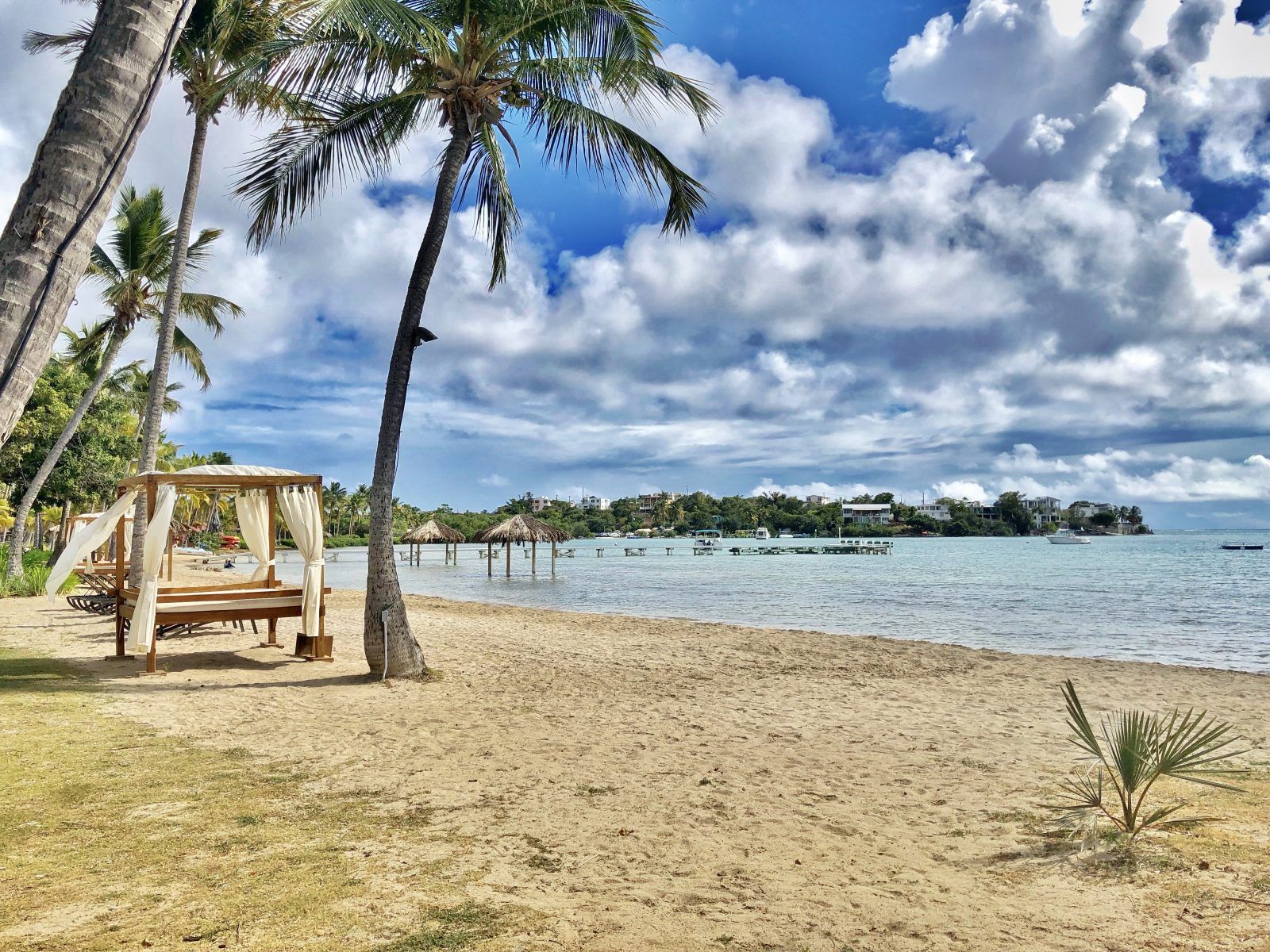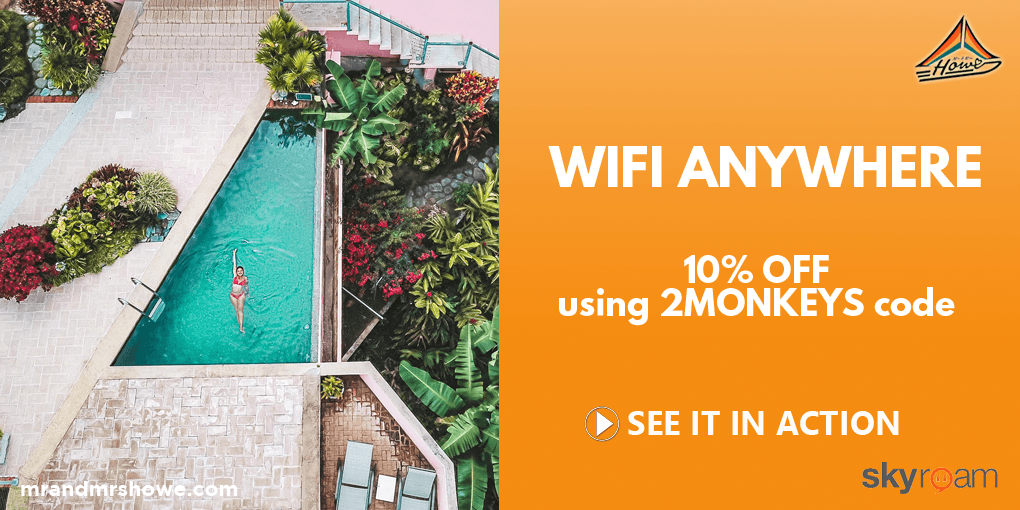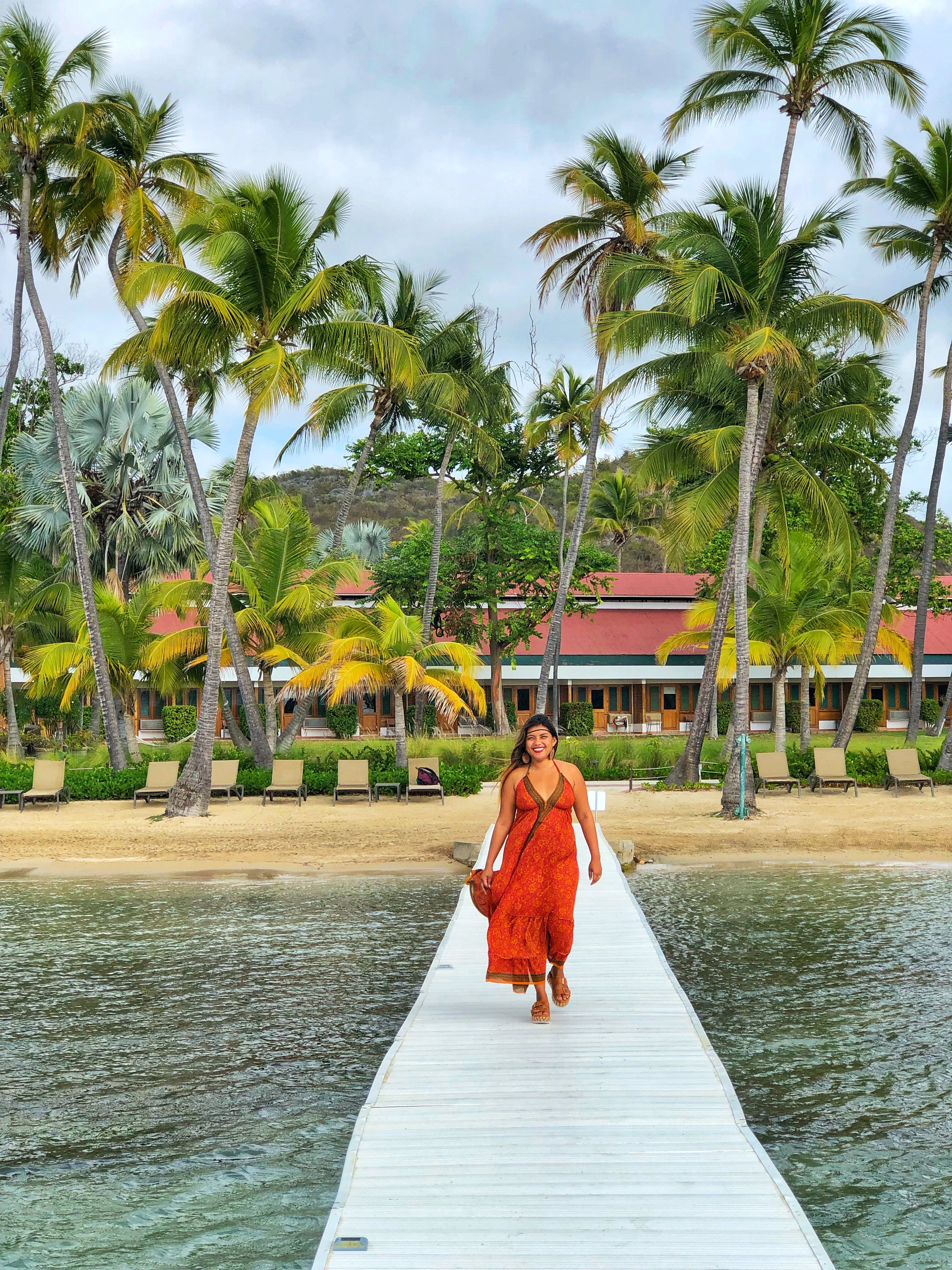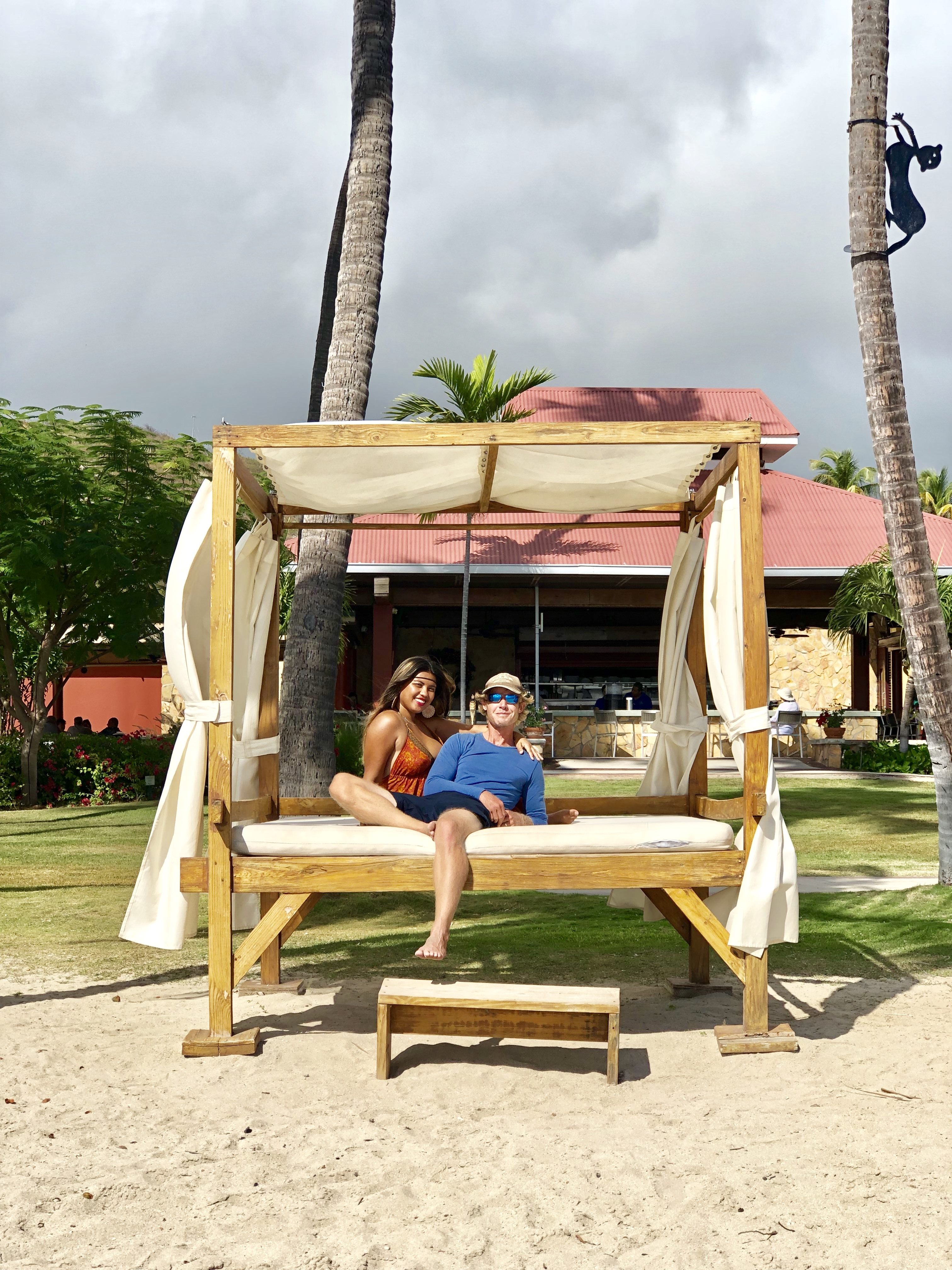Travel Guide to Puerto Rico– How, Where & Frequently Asked Questions
Puerto Rico ticks all the boxes for a picture-perfect Caribbean island holiday. Its white sandy beaches can compete with any in the world and vary from metropolitan cocktail heavens and bustling surfing hotspots to quiet island get-a-ways.
Easily accessible diving and snorkeling spots and the excellent bioluminescent bays offer great maritime experiences. Still, there’s more to this tropical island than sunny beach life. The Spanish-American influences make for a fun melting pot of culture with an abundance of heritage to explore and some delightful food to enjoy.
The island’s landscape offers green mountains, waterfalls, tropical rainforests and sandy beaches along most coastal areas. As Puerto Rico is a self-governing commonwealth of the United States of America, it’s a particularly hassle-free and therefore popular destination for US citizens – but well worth any trip to get there. It is known as the “Island of Enchantment”.

If you are looking for a new and exotic place for a vacation then perhaps the beautiful islands in Puerto Rico could be the answer. The island of Puerto Rico is such a wonderful destination for every vacationer who is searching for that satisfying island trip that they can enjoy and also will not be too costly.
Many people these days are traveling to this island to view the large array of attraction and fine resorts that are plentiful there at the many Puerto Rico resorts. Puerto Rico vacations are becoming quite more popular among many vacationers.
Table of Contents
Questions and Answers about Puerto Rico
Where is Puerto Rico?

Puerto Rico, a tropical Caribbean travel destination and one of the islands of the Greater Antilles in the eastern Caribbean Sea, located 125 km (78 mi) east of the island Hispaniola, (which is shared by Haiti and the Dominican Republic).
If compared, Puerto Rico’s area is slightly smaller than Cyprus or slightly less than three times the size of the US state of Rhode Island. Puerto Rico’s highest point is with 1,338 m Cerro de Punta. Puerto Rico covers 8,870 square kilometers of land and 4,921 square kilometers of water, making it the 164th largest nation in the world with a total area of 13,791 square kilometers. Puerto Rico is a dependent territory of The United States Of America. The population of Puerto Rico is 3,998,905 (2012) and the nation has a density of 451 people per square kilometer.
Is it safe to travel to Puerto Rico?

Puerto Rico is safer than many US states including California, New York, Washington, and Texas. Plus, San Juan’s crime rate is far below the national average. Petty theft—especially carjacking or pickpocketing—is the most common issue travelers face in Puerto Rico. Pickpockets are particularly common in touristy areas and on public transportation.
Muggings and scams do happen in urban areas, and tourists and people walking alone are typical targets. Similar to major cities in the mainland United States, taxi drivers have a reputation for overcharging people, and credit card skimming also occurs. There are some instances of drug and gang activity, and tourists have been caught in the crossfire, though it’s quite rare. The Zika virus is still prevalent in Puerto Rico. Not only are mosquitoes a risk, but there are also other bugs to be concerned about, such as ticks, fleas, and bedbugs.
How to Change Money in Puerto Rico?
Puerto Rico’s monetary unit is the United States Dollar (USD) as it is a commonwealth country of the United States of America. Puerto Ricans refer to the US Dollar as the ‘peso’ or ‘dollar’. There are several institutions in Puerto Rico offering currency exchange services as well as branches of major banks from the USA, Canada, and Europe.
ATMs located around Puerto Rico are linked to banking networks throughout the world. Credit cards are accepted at most places while some places even accept travelers’ checks. If you need money wired to you quickly, it is advisable to use Money grams. With this service, money can be transferred to you from anywhere in the world in just 10 minutes.
What is Unique about Puerto Rico?
Despite being small by size Puerto Rico is big in many things. such as Puerto Rico has the only rain forest in all North America is called El Yunque. The town which produces more milk for square miles is called Hatillo. Christ street was the first street paved in the new world. Puerto Rican cuisine is the most vivid manifestation of our unique culture, which melds Taino Indian, African, Spanish, and U.S. influences and traditions. The world biggest radio telescope is in Arecibo PR.
What is the culture of Puerto Rico?

Puerto Rico’s culture is a lively mix of indigenous Taínos, Africans, and Spaniards. This fusion extends to almost every aspect of Puerto Rican life: our rich cuisine, colorful arts and crafts, vibrant music, and traditional festivals. From European architecture, Afro-Caribbean beats to indigenous sculptures, during your visit, you’ll experience the integration in every sight, taste, and sound. Puerto Rico’s yearly calendar is teeming with mesmerizing cultural events, such as the Fiestas de la Calle San Sebastián, a celebration that marks the end of Christmas; and The Heineken Jazz Fest, which brings together international Latin jazz stars during the spring. It doesn’t matter when you visit, you’ll have plenty of opportunities to dive into our culture.
What is the Geography of Puerto Rico?

The island of Puerto Rico is a very popular tourist destination because of its location, rich history, and warm atmosphere. The island is located in the Caribbean, between the Caribbean Sea and the North Atlantic Ocean, east of the Dominican Republic, about 1,000 miles (1,600 km) southeast of Miami, Florida.
Puerto Rico is almost rectangular in shape; approximately 100 miles long by 35 miles wide and is the smallest and the most eastern island of the Greater Antilles (Cuba, Hispaniola, Jamaica, and Puerto Rico).
It consists of the main island of Puerto Rico and several smaller islands and keys, including Vieques, Culebra, Culebrita, Palomino (known by some by the Spanish Virgin Islands), Mona, and Monito. Its coasts measure approximately 580 km, and if the adjacent islands Vieques and Culebra are included the coast measures approximately 700 km. With an area of 3,425 square miles (9,104 sq km), Puerto Rico is the third largest island in the United States and the 82nd largest island in the world.
How to travel to Puerto Rico?

- From London: Iberia, United Airlines, Air Canada, Virgin Atlantic, British Airways, and KLM offer flights from London to Puerto Rico.
- From the USA: Copa, Alaska, Avianca, and Condor offer flights from the USA to Puerto Rico.
- From Dubai: Air Canada and Jet Blue offer flights from Dubai to Puerto Rico.
- Singapore From: United Airlines offers flights from Singapore to Puerto Rico.
How to travel in Puerto Rico-Transport in Puerto Rico
- Taxi: White tourist taxis with “turístico” logos congregate around the cruise ports of San Juan. Taxis can be expensive, with rates from the airport to Condado, Old San Juan, and Isla Verde.
- Public buses: San Juan is serviced by Autoridad Metropolitana de Autobuses, which runs extensive routes throughout town and to the beaches.
- Private transfers: If you’re staying in compact San Juan then you won’t need a car. And those seeking a quiet vacation along the beaches of Rincón, Vieques or Culebra might find one more of a nuisance than a necessity. You will need a car, however, if you want to branch out and explore.
What’s the food like in Puerto Rico?
Although Puerto Rican cooking is often compared to Spanish, Cuban and Mexican cuisine, it is a unique tasty blend of Spanish, African, Taíno, and American influences, using such indigenous seasonings and ingredients as coriander, papaya, cacao, nispero, apio, plantains, and yampee.
Locals call their cuisine “cocinacriolla”. Cocinacriolla (Créole cooking) can be traced back to the Arawaks and Tainos, the original inhabitants of the island, who thrived on a diet of corn, tropical fruit, and seafood. The mingling of flavors and ingredients passed from generation to generation among the different ethnic groups that settled on the island, resulting in the exotic blend of today’s Puerto Rican cuisine.
What is the weather like in Puerto Rico?

The climate of Puerto Rico is tropical, hot all year round, with a hotter and muggy season from May to October, and a relatively cool season from December to March, with November and April as intermediate months. In Puerto Rico, the weather is a balmy average of 80°F – 85°F year round.
Important things to pack for a trip to Puerto Rico
Clothing: Linen shorts or khakis, and t-shirts and tank tops are common wear amongst tourists. Men in business settings should bring along a sports jacket and a tie. Women can bring along a nice sundress, a cocktail dress, or a pants suit with the appropriate accessories in a formal wearing.
Shoes: Don’t forget sandals or flips flops.
10 Amazing places to see and things to do in Puerto Rico
1. El Yunque National Forest
To experience some of Puerto Rico’s lush inland beauty, this is the place to visit. Spread along the Luquillo Mountains, including Pico El Yunque, El Yunque National Forest is home to the only tropical rainforest in the National US Forest System. The climate here is considerably cooler than along the coast and at lower elevations, and it is noticeably wetter. Walking
2. Culebra Island (Isla Culebra)
Although Culebra is often mentioned in the same breath as Vieques, this smaller island with beautiful beaches and lush hills has its own unique character. The pace here is unhurried and the atmosphere relaxed. Ecotourism is big on the island and many of the tourist establishments are run by expats.
3. Old San Juan (San Juan Viejo)
Walking the streets of Old San Juan, with its lovely colonial architecture and imposing forts, is like stepping back into another era but with a number of modern conveniences.
The entire area is a UNESCO World Heritage Site, with hundreds of restored 16th- and 17th-century Spanish colonial buildings. Today, visitors can dine, shop, or even stay in some of these beautiful old structures.
4.Vieques Island
Vieques, eight miles from mainland Puerto Rico, has become a popular beach resort with small, upper-end hotels, restaurants, shops, and galleries. With the departure of the United States Army from the island in 2003, Vieques turned its focus to tourism.
5. Luquillo Beach

For an easy escape from the busy beaches of San Juan, Luquillo is a terrific option. Luquillo Beach, just a short drive from the city, is a palm-lined stretch of golden sand that offers a fair degree of tranquility, without surrounding high-rise buildings and development.
6. Surfing and Whale Watching at Rincon

Often called “Pueblo del Surfing” (Surfing Town) and “Little Malibu,” Rincón is known to Puerto Ricans as a “Gringo Paradise.” The dominant language in the area is English, with many foreign surfers and other expats making this town their home.
7. Arecibo Radio Telescope (Observatorio de Arecibo)
The Arecibo Radio Telescope features a 20-acre dish set in a sinkhole. Here, astronomers have proved the “music of the stars” (pulsars and quasars) and examined the moon, the earth’s ionosphere, and other planets.
8. Ponce’s Historic City Center
While Ponce is a large city and generally not on the typical tourist route through Puerto Rico, its historic city center is a delight, with 17th-century architecture and open plazas. The Plaza Las Delicias is a good starting point for visitors, with cafés and park benches for convenient people-watching.
9. Rio Camuy Caves (Parque de lasCavernasdel Río Camuy)
The Rio Camuy Cave Park features a huge cave system covering 268 acres and is thought to be the third largest cave system in the world. A trolley bus transports visitors to a 200-foot deep cave, or sinkhole, which is now a preserved area known as Cueva Clara Empalme.
10. Isla Verde
For the all-inclusive crowd looking for nice resorts and a decent beach within easy reach of a major airport, Isla Verde is just the answer. Everything an overworked, sun-seeking, beach-loving vacationer could ask for – minus Puerto Rican culture – can be found right here.
Final thoughts on Puerto Rico
No passport or customs required for United States citizens to Puerto Rico and for others, you’re required to have a valid USA Visa to enter Puerto Rico.
The island is composed of over 250 miles of great sparkling beaches, including an ample supply of self-contained luxury resorts, hotels, and casinos.
But the wise visitor to Puerto Rico takes the time out from the ever-present sun to pursue the island’s other great charms, beginning perhaps with the historic majesty of the capital of San Juan and the southern majestic city of Ponce.




























Hello. Is there a puerto rico embassy in the Philippines? Is it possible to process Puerto Rico Visa in the Philippines?
You’ll need to contact the US Embassy
I recommend buying the book ” Puerto Rico, off the Beaten Path ” and studying it.
Get the latest issue.
Then, take at least 2 weeks to travel around the island and stay at different small hotels at various elevations.
This way, you can do what the locals do and avoid the tourist traps.
For example, I never hear the Coamo Thermal Hot Springs park mentioned to tourists, or visiting a coffee plantation.
Puerto Rican coffee is right up there with Kona and Jamaican coffee, but you may never know it, because very little of the coffee leaves the island.
Puerto Rico is at the same latitude as Kona and Jamaica.
Stop at some of the” kioskos ” ( roadside stands ) to eat and shop for unique local items.
Drive up to Cerro de Punta, where at above a 4,000 feet elevation, you can have a great view of the island on a clear day. Cool temperatures, too.
Be prepared to experience lots of poultry and Paso Fino horses.
Also be prepared to feel like you are in a 3rd world country during your travels.
Be prepared to communicate in Spanish in
many areas.
Most Puerto Ricans will go out of their way to help tourists, though.
Put some Puerto Rican emblems and / or decorations on your rental car so that you might conceal, to some degree, that you are a tourist. Window debris from broken into rental cars that had been parked and not monitored is not an unusual sight
Bars on the windows of the houses will give you an idea of how the locals regard their security.
Keeping all of this in mind, you’ll either have a great experience travelling around, or resign yourself to the comfort of a relatively secure resort.
Bienvenidos a Boricua ( Welcome to Puerto Rico )
THANK YOU!!! This is really helpful!